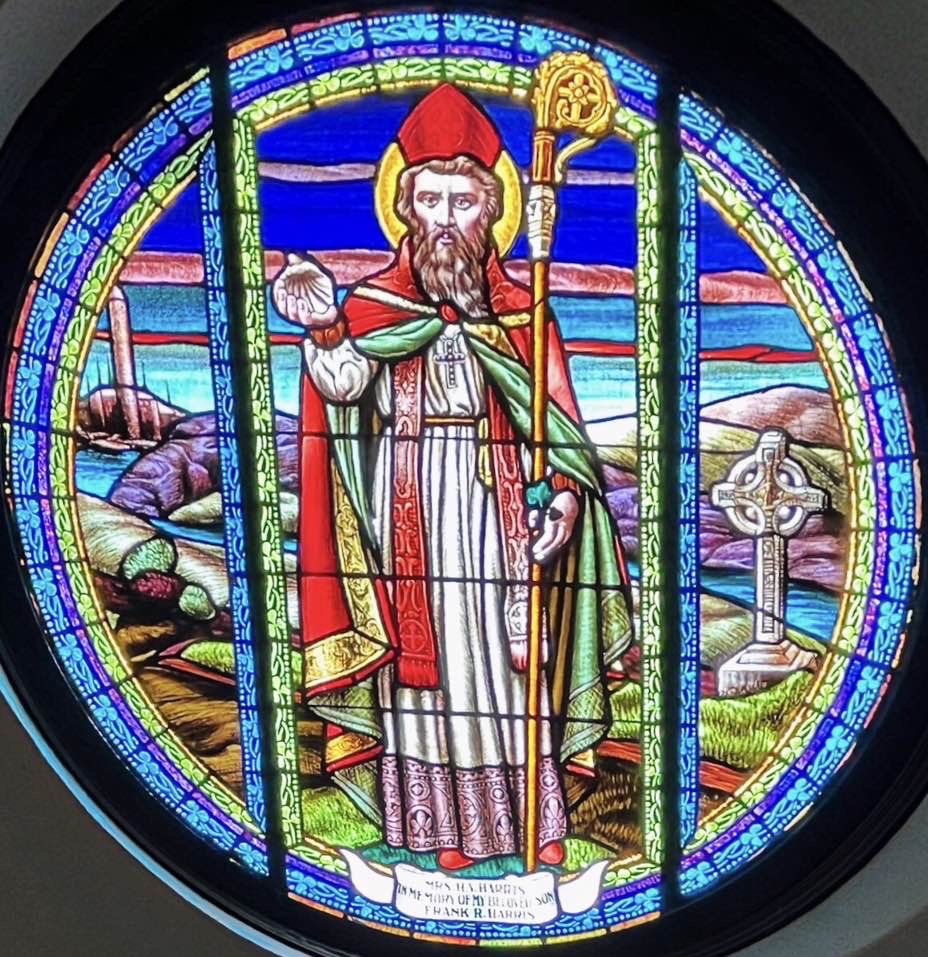- The Fourth Face of V: Science ascends, Man gives way—Wednesday, April 24th, 2024
-
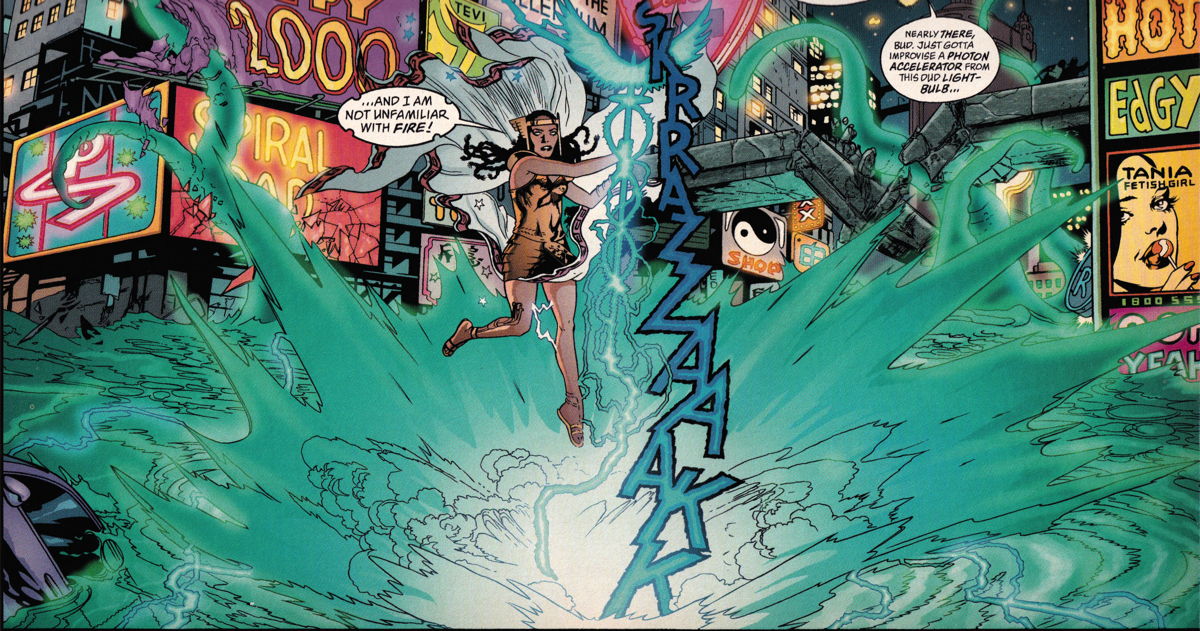
Promethea directly invokes a connection with Prometheus and stealing fire from the gods. While the Five Swell Guys muck about ineffectually with technology.
If there’s one commonality between Moore’s variant worlds, it is a moral foundation weakened to nonexistence. And if there’s any commonality as to why, it is because technological progress has enervated us. If his appendix to From Hell can be trusted, Moore’s vision of technological progress is a terrifying one. From Hell was set in a squalid pre-technological Eden more alive than the modern world it preceded.
Scientific advances that moved away from the human—such as using dogs to solve crimes—were ridiculed. Gull’s vision of the future showed him a technological Olympus that had reduced mankind to emotional amputees.
In V for Vendetta, as in Orwell’s 1984•, technology exists only for the government to stifle the masses. Promethea gives us a near-future where our marvelous utopia is even more heavenly—and even more enervating and stifling—than what Gull foresaw in From Hell. The Internet exists but has little effect on people’s lives except as a barely mobile telephone/post office. Promethea’s only nods to modernity are the meme-like Weeping Gorilla billboards, a corporate top-down messaging system more like Wells’s Babble Machines in The Sleeper Awakes than modern viral memes. In the world of Promethea Sophie doesn’t even consider using the Internet for research. She goes to the library to find out where Promethea came from.
Superheroes in Promethea are Science Heroes. The main science heroes are the very impotent Five Swell Guys. They have no idea how to classify Promethea, because they can only see her as “some kind of science heroine”.1 They are blind to the mysticism inherent in her.
Promethea highlights both the best and worst of Moore. It’s a sprawling epic filled with emotive personal moments, interspersed with interminable lectures about the nature of illusion and reality, and why a world that most people find perfectly acceptable requires revolution.
- Why does the Institutional Left hate Israel so much?—Wednesday, April 17th, 2024
-
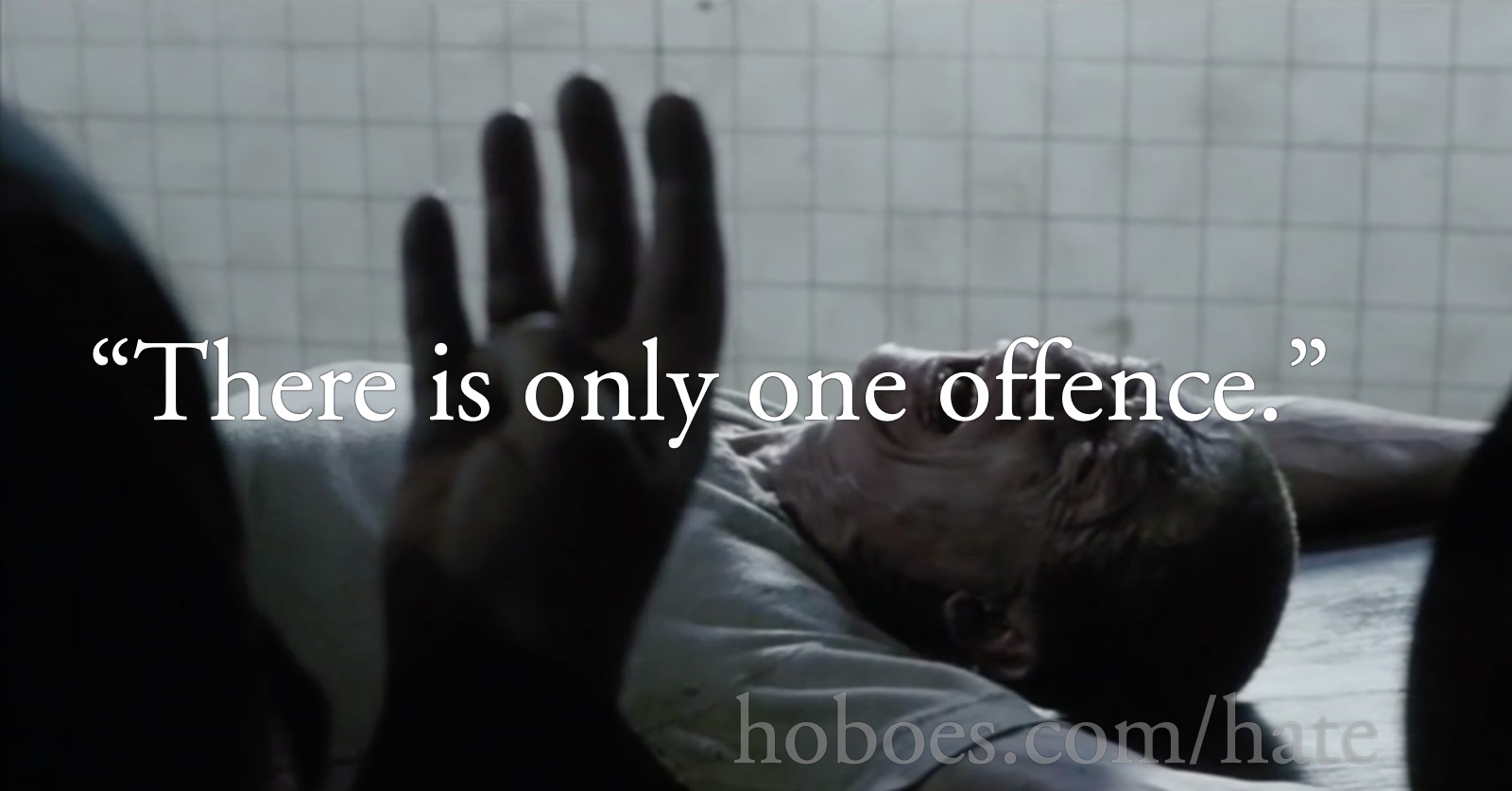
If anything in modern life could be worse than the October 7 atrocities against Israelis, it would be the unalloyed support those atrocities have received from the institutional Left in America. Everywhere you turn in academia and even so-called “mainstream” news sites, there are people in power attempting to justify not just the invasion but the kidnappings, rape, and torture that was its entire point.
Why does the left hate Israel so much? While the institutional Left seems to hate just about everyone, here you have a nation of peoples who in other countries reliably vote far left, and whose country began explicitly communist and remains a very left-leaning country.
In my opinion that’s an explanation for the hate, not a contradiction. Israel may have a demonstrably left government, but it began even further left than it is now. Israelis quickly discovered that communes and kibbutzes do not work on a countrywide level. Rather than put up with famine and corruption, they changed. They learned from their mistakes.
This is anathema to the leftist elite. The institutional left deliberately never learns from that kind of mistake and especially never allows its constituents to learn from that kind of mistake. Instead, they blame an imaginary far right for their own failure and double down on failure.
That’s the whole point of creating crises, to use them to gain more power. Looking at a crisis and saying, hey, maybe we did something wrong to get here, is missing the entire point of their policies.
It is power and domination.
You’re a Black woman who turns against the left? You’re neither “a true Black” nor “a true woman”. They actually say this. If you’re a Hispanic who argues for individual liberty? You’re a race traitor. That’s not a phrase I made up. It’s a phrase of the left to describe people who are non-white and yet do not submit to the left.
The institutional Left see everything in terms of race, so it isn’t surprising that when an entire country of Jews turns against socialism even slightly, the Left doubles down on antisemitism.
- The Third Face of V: The Freedom to Starve—Wednesday, April 10th, 2024
-
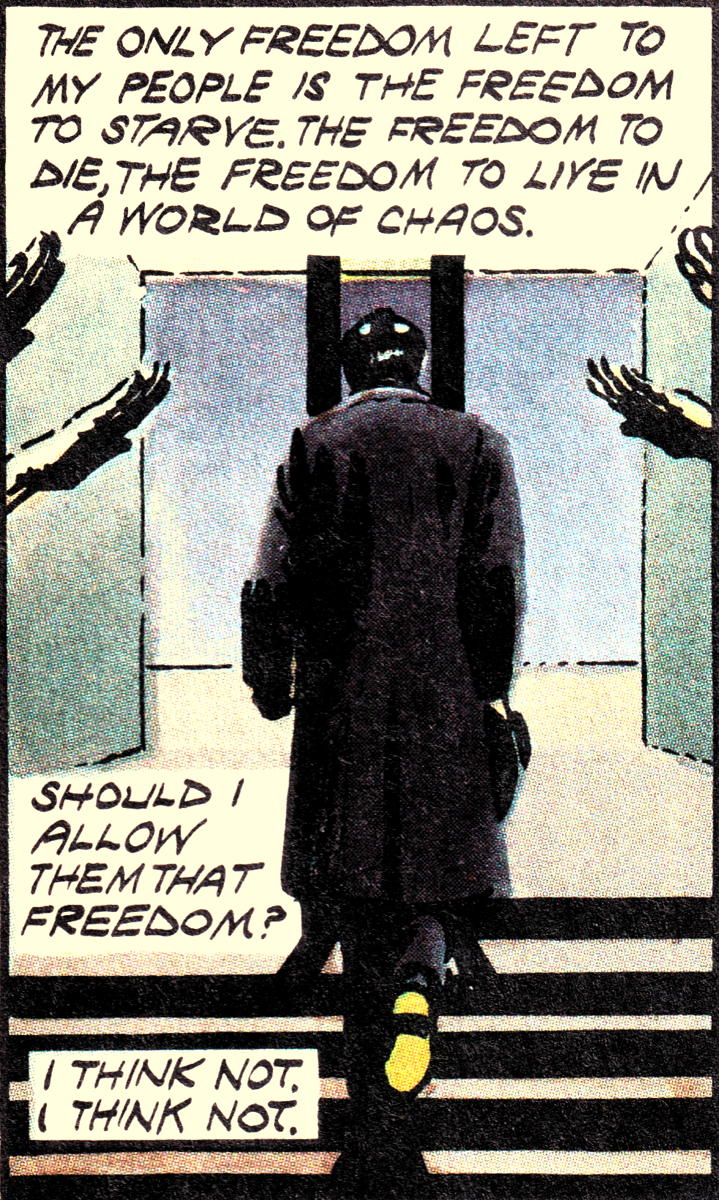
“The only freedom left to my people is the freedom to get sick. Should I allow them that freedom?”
Is V in V for Vendetta good or evil? Do his ends justify his means? Are his ends even desirable? What Norsefire did to bring peace to England and to bring food to the people was horrific. But what V does to Evey is also horrific, on a personal level, and what V does to the people of England is horrific on a mass level. V, Veidt, and Constantine have a vision, but their methods are as much Jack the Ripper as William Withey Gull’s was in the pursuit of his own vision, and may well share nearly as much of Gull’s madness.
We have little sense of how much of what V says is true, and how much he made up to justify his torture of Evey and England. His motto is By the power of truth, I, while living, have conquered the universe. V, however, uses everything but the truth in his relationship with Evey, creating a semi-imaginary prison and fake death sentence to indoctrinate her into his own version of anarchy.
Evey even acknowledges the technique: she can’t know if the toilet paper memoirs she read when confined are real. But by then she’s internalized V’s worldview enough that it doesn’t matter. Moore leaves no ambiguity here for the reader: she has been brainwashed, using standard brainwashing techniques.
The Norsefire of V for Vendetta succeeded because people were dying of starvation and failing infrastructure. Under Norsefire the people of England didn’t have the plenty available to the typical eighties comic book reader, but neither were they dying of starvation. By the end of the book, what has V given the people of England? Starvation and a broken infrastructure. And we don’t even know if England is free from tyranny!
The only freedom left to my people is the freedom to starve. The freedom to die, the freedom to live in a world of chaos. Should I allow them that freedom? I think not.—Adam Susan
As presented in V for Vendetta, this could only be a totalitarian thought. But think of what’s happened over the last four years. Should we have allowed people the freedom to catch COVID? Or should we have let them live in the chaos of freedom of movement, freedom of association, and the choice of how, and whether, to protect themselves against sickness?
If asked in the context of the COVID restrictions of 2020 and the vaccine requirements later, a lot of people today agree with Adam Susan’s conclusion. “I think not.”
- Easter Candy-Cane Ice Cream—Wednesday, March 27th, 2024
-
As regular followers of Mimsy Were the Borogoves know, I have a tradition that spans from Christmas to Easter. I keep the candy canes from Christmas and make a dessert from them to help celebrate Easter Sunday.
There is a spiritual meaning to the ubiquitous Christmas candy cane. Whether that meaning was part of their invention or not, we don’t know, but as Catholics often do, we have invested this celebratory food with spiritual meaning. We just don’t know if that meaning was part of the candy cane tradition from the start. Once you see it, however, it’s hard to forget: the candy cane is a shepherd’s staff. The next time you see a nativity painting, take a look at the staffs the shepherds are holding. Very likely, they’re going to have the same shape as a candy cane.
Even today, the curved shepherd’s staff is ubiquitous in Catholic ritual. Every bishop has one. Their crozier is a shepherd’s staff, and it has the candy cane loop.
Candy canes also—turn one upside down—represent the letter “J”. Of all the symbolism attributed to the candy cane, this, I’ll admit, is most likely to be ex post facto.
The white and the red, much like a barber’s sign where the colors represent blood and bandages1 represent Christ’s blood and purity.
- The Second Face of V: The Twilight of Man—Wednesday, March 20th, 2024
-
Twilight is difficult to discuss on the same terms as V or Watchmen because it was never written. All we have is Moore’s proposal to DC Comics. We know from Moore’s recounting of the evolutions of both V for Vendetta and Watchmen that his stories change significantly between the idea and the finished product. The proposal is less a story than an attempt to talk a language DC will understand: how much money DC will make if they accept.
It is very clear, however, that Twilight features a manipulative bastard in John Constantine. Constantine is willing to shed any amount of blood to ensure his vision of a better future for humanity. Constantine even chooses to define what it means to be human. He ruthlessly engineers brutal killings of those who he decides are not human, from the metalman Gold to many of the various alien races in the universe.
In a sense, Twilight is what happens after the last page of V for Vendetta, Watchmen, or Miracleman: one decidedly not superior normal human’s attempt to overthrow objectively superior overlords.
By Promethea, Moore may have finally begun to tire of his manipulative Vs, or he may have wanted to capstone these stories with magic as a redemptive power for humanity. Promethea’s closest manipulative analog, Jack Faust, isn’t even a main character. Most of his manipulations of Sophie and Promethea happen off screen, and it’s debatable how much of an effect Faust had on this incarnation of Promethea or on the success of her Promethean task. But Promethea’s new era of human freedom, like that of V for Vendetta, Watchmen, and Twilight, still only comes after a lot of carnage and death.
Between you and me, I’m terrified.1
- Vermont Boiled Cider Pi—Wednesday, March 13th, 2024
-

Cider pie and peanut butter ice cream. Pi Day doesn’t get better than this.
Tomorrow is Pi Day. And have I got a unique pie for you this year!
One of the more obscure discoveries I made while researching the El Molino Best cookbook was Ellen and Vrest Orton’s Cooking with Wholegrains. It was so good that I included their recipe for Green Mountain Hermits in my announcement that I’d made El Molino Best available for download—even though it has nothing to do with El Molino Mills except that if you’d made it in the fifties you might have used their cornmeal.
It was so good that I went looking to see if the Ortons had written any other cookbooks. And it turns out that Vrest Orton, in 1973, wrote The American Cider Book. I was able to find a copy on the Internet Archive and it was unique enough, with enough very interesting recipes, that I tracked down a print copy.
That book provided what is probably my most common breakfast eggnog. It also provided this year’s Pi Day pie, Vermont Boiled Cider Pie.
This is an amazing pie. It’s very much unlike any apple pie I’ve ever had. It’s creamy, rich, and the filling almost literally melts in your mouth.
You may be wondering how to get boiled cider. It’s not generally available outside of the northeast, but it’s easy enough to make if you can get apple cider. Put at least five times as much cider into a pan as you want boiled cider. Then simmer very low for a few hours until it reaches the consistency of maple syrup. That’s the entirety of Vrest Orton’s instructions for making boiled cider.
- Catching up with Eddie Doucette—Thursday, March 7th, 2024
-
“One thing about AM radio, after the sun goes down, is picking up a faraway signal through the interference and the ether, where the magic crackles through a speaker. This is how people in the Midwest learned of Eddie Doucette in the late 1960s, broadcasting play-by-play for a fledgling NBA expansion team, the Milwaukee Bucks.”
Catching up with Eddie Doucette is a really nice interview with Chef Eddie Doucette’s son, the great sports broadcaster, in this week’s Shepherd Express of Milwaukee, where he had his breakout broadcasting Milwaukee Bucks games in the late sixties.
Gregory Harutunian: Catching Up with Eddie Doucette, ‘The Voice of The Bucks’ (#)
- The First Face of V: A Crucible of Fire—Wednesday, March 6th, 2024
-
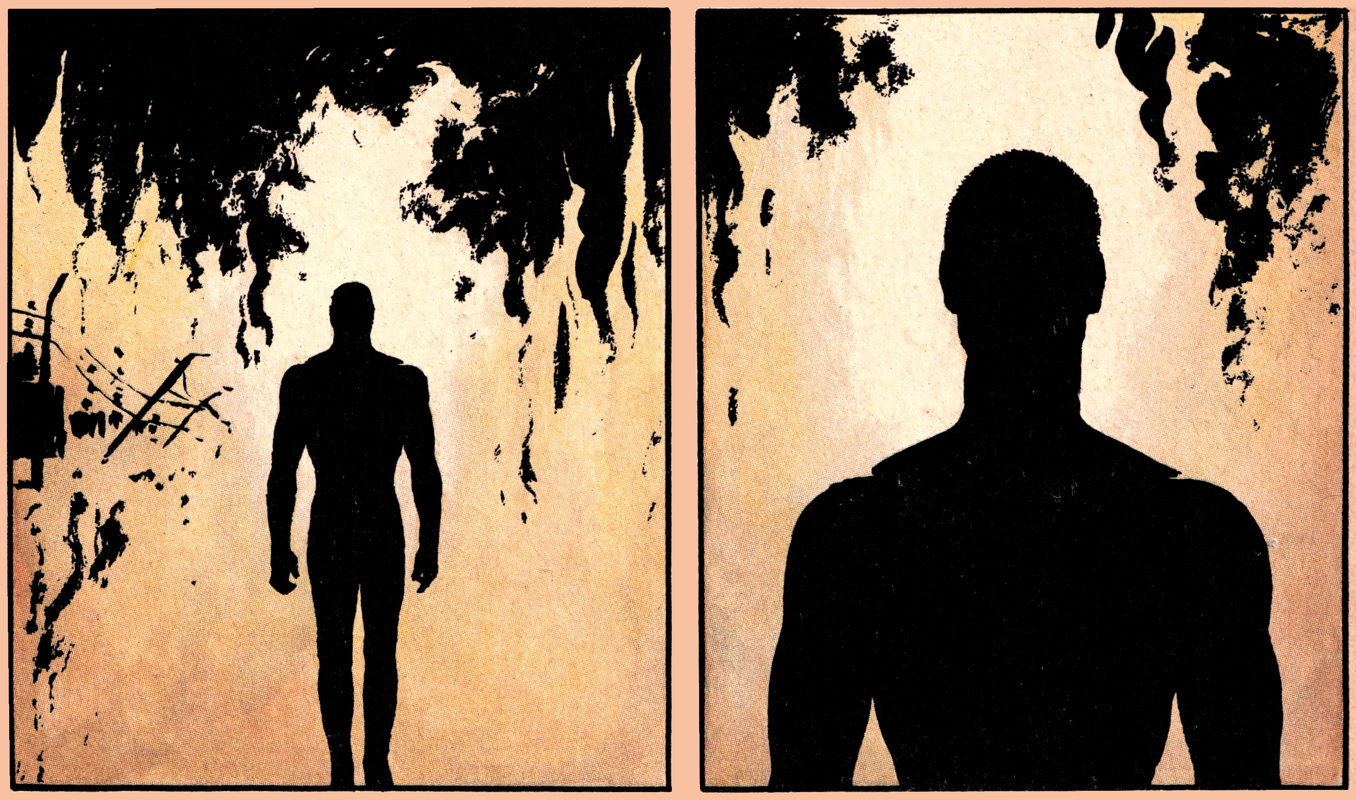
V walking from the Larkhill Resettlement Camp after setting it on fire.
In V for Vendetta, our protagonist is V, who is single-handedly and violently using his superpowers to overthrow the established right-wing totalitarian government. In Watchmen, our protagonists are superheroes working to maintain an established right-wing democratic government against the single-handed violent reforms of an enlightened mad scientist.
V is a creature of man. In a way, he’s a Frankenstein’s monster, created by a committee of scientists experimenting on individuals for the betterment of society.1 Veidt, on the other hand, is a creature of God—or fate—who was born with his abilities but believes that he’s self-made. Both Veidt and V are intensely smart. In a sense, both are even forged in a crucible of fire. V started a fire to escape the concentration camp where he was held for experimentation. Veidt’s fire was the Comedian burning a map of the United States.2
This was a critical moment in Watchmen: Veidt had, earlier, been bullied and beaten by the Comedian; knowing what we know about the Comedian, it was probably very brutal. When the Comedian burned the map and told the assembled heroes that “It don’t matter squat because inside thirty years the nukes are gonna be flyin’ like maybugs…”, Veidt could have chosen to ignore it, as the rest of the heroes did. He could have chosen to side with humanity, trusting that humanity’s innate wisdom would eventually overcome this future, as it has—so far—in the real world.
Instead, Veidt chose to side with the bully. He internalized the Comedian’s view of the world and set about to fix the world, regardless of the cost in human lives and suffering. In both the Comedian’s view and Veidt’s view, humanity needed protection, and they most needed protection “from themselves”. The Comedian felt that other men needed to be protected from their baser instincts. Veidt, however, felt that humanity needed to be rescued from its lack of foresight.


Mimsy Were the Borogoves
Civilization is not compassion; compassion is possible because of civilization. — Jerry Stratton (The new barbarism: A return to feudalism)

